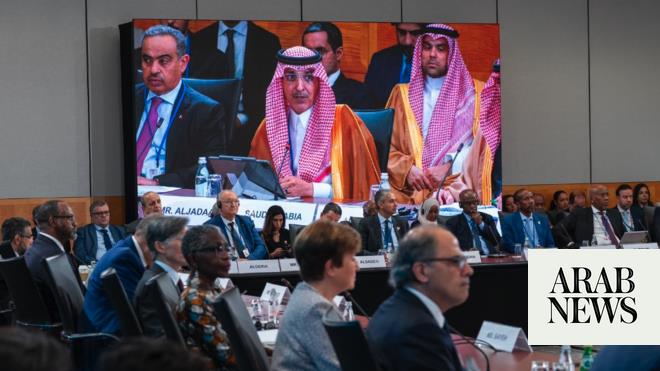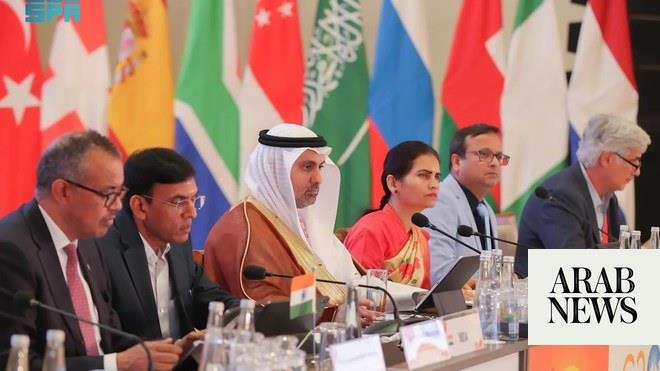
JEDDAH: Global organizations must produce a coordinated response to the coronavirus pandemic with an emphasis on supporting countries in need, the Saudi health minister said on Sunday.
Dr. Tawfiq Al-Rabiah was speaking at a “virtual” meeting of G20 health ministers under the Saudi presidency, to discuss new measures to confront the outbreak.
He called for the creation of a global task force to respond to pandemics, an innovation hub for knowledge sharing to improve value in health, and a patient safety leaders group to provide shared platforms aimed at reducing patient safety risks.
Saudi Arabia reported 1,088 new cases of COVID-19 on Sunday, raising the total to 9,362, and the death toll rose by 5 to 97. Health Ministry spokesman Dr. Mohammed Al-Abd Al-Aly said more than 180,000 people had now been tested for the virus.
Worldwide, nearly 2.4 million people have been infected, and the death toll is nearing 165,000.
The European Center for Disease Control said the continent now had more than 1 million confirmed cases and almost 100,000 deaths.
Spain had the most cases in the region with 191,726, followed by Italy, Germany, Britain and France.
It listed Italy as having the most deaths in Europe, with 23,660, followed by Spain, France, Britain and Belgium. Europe now accounts for almost half the global case load and more than half the total deaths.
Italy on Sunday registered the lowest number of deaths in a month, with the death toll rising by 433 in 24 hours. That brings the national total to 23,660, still the second-highest in the world after the US.
Paris shut down part of its water system after discovering trace amounts of the virus in water used for cleaning streets and watering public gardens.
A municipal water management laboratory discovered “tiny traces” of the virus at 4 of 27 sampling points in the city’s network for non-drinking water.
An emergency technician pushes a suspected coronavirus patient into an ambulance on Sunday during the coronavirus disease outbreak in Abadino, Spain. (Reuters)
The non-drinking water is pumped in from the Seine and an adjacent canal, and is used for street cleaning, watering parks and in some city fountains. All Paris parks, gardens and fountains are closed as part of France’s anti-virus lockdown.
In the US, the death toll climbed past 41,000 with more than 746,000 confirmed infections, according to a tally by Johns Hopkins University of national health reports.
The death toll in New York dropped again, which Gov. Andrew Cuomo said meant the state was “on the other side of the plateau” and that social distancing practices were working to stem the spread of the virus.
But Cuomo and Mayor Bill de Blasio maintained their warnings that people in New York city and the rest of the state needed to stay vigilant.
De Blasio accused President Donald Trump of betraying his fellow New Yorkers by failing to push for billions of dollars in additional federal aid needed to help the city deal with the coronavirus economic crisis.
US President Doland Trump and VP Mike Pence look on as a video plays of New York Governor Andrew Cuomo giving a press conference in an earlier briefing during a Coronavirus Task Force press briefing at the White House in Washington, DC, on April 19, 2020. (AFP / JIM WATSON)
Too early to ease lockdowns: WHO
The head of the World Health Organization has warned countries that are moving to ease their pandemic lockdowns to be prepared to respond rapidly to any resurgence.
Tedros Adhanom Ghebreyesus told a virtual meeting of health ministers from the G-20 group of major developed and emerging economies Sunday that he was “encouraged” by the fact that several are “starting to plan how to ease social restrictions.”
But he said “it is critical that these measures are a phased process.”
Tedros told ministers that “lifting so-called lockdown restrictions is not the end of the epidemic in any country; it’s just the beginning of the next phase.”
He said that “it’s vital in this next phase that countries educate, engage and empower their people to prevent and respond rapidly to any resurgence; to ensure they have the capacity to detect, test, isolate and care for every case, and trace every contact; and to ensure their health systems have the capacity to absorb any increase in cases.”
Tedros also expressed concern about the growing pace of the pandemic in poor countries that lack the resources to cope with a major outbreak.
In an apparent retort to leaders such as US President Donald Trump, who slammed the organization’s response to the pandemic, Tedros insisted that “since the beginning, WHO has sounded the alarm bell loud and clear.”
He also urged ministers “to continue to fight the pandemic with determination, guided by science and evidence.”











